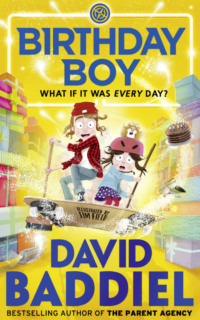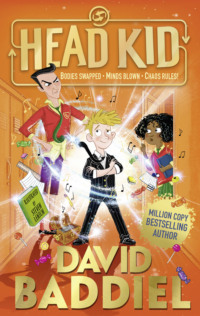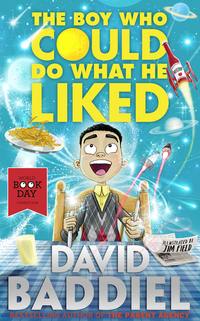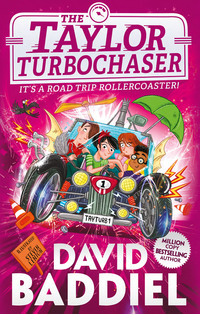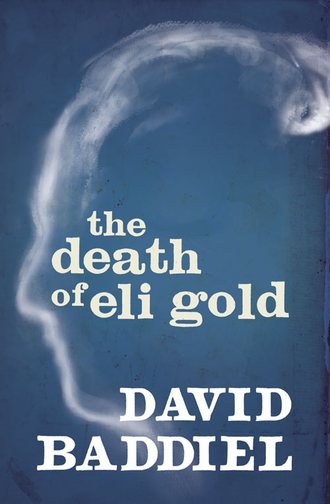
Полная версия
The Death of Eli Gold
She blinked, and moved her head back a bit. ‘I’m sorry, darling?’
‘I heard Dr Ghundkhali say that that’s what Daddy is in. A comma. At first I thought they meant like that little thing you write in a sentence when you want the person reading it to stop, but not for as long as when you do a full stop – I thought maybe it was something to do with Daddy being a writer? – but then I realized it must be a word that sounds the same but means two different things. Like pair. Or been.’
Mommy looked at me. She was making a weird face, all frowny. Then, behind me, I heard one of the nurses – I think it was the one with the curly hair and the banana nose – laugh. I could feel my face going red, because I knew straight away that I must have said something stupid or kid-like, and I hate doing that – I hate doing it in front of anyone, and I especially hate doing it in front of Mommy. I am Colette Gold, and I do not say stupid eight-year-old kiddie things that grown-ups laugh at because they’re so cute. I got so cross that I started to feel another little tear come out, which only made it worse.
‘Colette, darling,’ said Mommy. ‘Don’t get upset. That’s a very good question. You just slightly misheard Dr Gundkhali. He would have said that Daddy was in a “coma”. You see, it sounds a bit like comma, doesn’t it? But it has an extended – like a longer – “o”. Coama.’
‘Oh,’ I said. Then, like I was saying it in slow motion: ‘Coa … ma.’ She nodded, one of her slow nods which makes her fringe move like a little curtain in front of her eyes. No one said anything for a bit. So then I said: ‘Yes, but what does it mean?’
Mommy opened her mouth to speak, but then the hospital door banged really loudly, and a man came in. He was fat, and sweaty, and his suit was too tight for him. Mommy got up, and looked at him for quite a long time without saying anything.
‘Hello, Freda,’ he said.
‘Colette,’ she said. ‘Come and meet your half-brother Harvey.’
* * *
This is too much rain, thinks Violet. She means too much rain to go for her walk, but is aware as she thinks it of a sense that, for some summers now, there has been too much rain. It used to be funny, the unpredictability of British summer, something that she might have commented on with a resigned shrug to her neighbours if they bumped into each other buttoned-up in July, and the neighbours would nod and smile resignedly back, and it was a nice, reassuring, confirmation that they shared the same mock-weary national expectation. But that was just about the way the sun used to stand the country up. It was not about rain like this, like a monsoon, hitting the pavement so hard that filthy fat globules of dust-water fly up from the cracks.
She has opened the frosted fire-glass front door, and is standing on the top step, looking out at Redcliffe Square. She already knows from looking out of her room window – and from the way the stuck branch trembled, like it was freezing – that the weather was probably too bad to venture outside, but she thought it might look better at ground level. It does not. If anything, standing here brings home the problem more clearly, which is not so much the weather as the ground itself, transformed by the rain into an assault course for her and her stick. She does not mind the weather, really: she does not mind getting a bit wet, or having her hair blown into a mess, even though she had only last week been to the hairdressers and had it styled and coloured (plus a root perm to give her some body and to cover the small bald spot just below the crown). But she does mind being attacked by the ground; she minds slipping on a puddle or being blown over by the wind and crashing to the concrete and becoming in an instant one of the residents who has had a fall – the three most dreaded words at Redcliffe House, heard only in whispers, the care home equivalent of Auschwitz’s chosen for selection.
She shuts the door: the cold street air in her nostrils mingles for a second with the sickly overheated scent of the hallway. She had hoped to buy a paper, to see if there was any more news about Eli. Three newspapers – the Mail, the Telegraph and the Express – are delivered daily to the house, but when Violet enters the living room, she sees that, as ever, they have been snapped up by those (mainly male) residents keen to demonstrate their lack of senility. Joe Hillier, she notices, is busy consolidating this demonstration using the Telegraph, the paper which best allows for the requisite amount of page-flapping and harrumphing. Luckily, for Violet’s purposes, Pat Cadogan collars her immediately to give her a long report on the condition of her shingles, allowing her to feign concern while standing at the back of Joe’s chair looking over his shoulder.
Sure enough, Joe turns the page out of the front few pages and all their pressing seriousness about politicians she can no longer remember the names of, and there he is – her ex-husband (the phrase sounds ridiculous, even inside her head), centred on the page, the same black-and-white photograph that had been on television the day before.
‘What is it?’ says Pat, a grimace of irritation breaking though her seen-it-all implacability: she had noticed Violet’s lack of concentration, her failure to nod at her retelling of the last two castigations of the house doctors.
‘Sorry Pat … I … Joe?’
Joe Hillier looks up, but, as Violet is behind him, he simply scans the room, shrugs his shoulders, and puts it down – in a rather matter-of-fact way – to voices in his head.
‘Joe!’ She taps him on the shoulder. He tries to look round, but the turning circle of his neck fails him, and he has to shift his body sideways to see her.
‘What is it?’
‘Would you mind if I had the paper?’
He looks at it, folded now on his lap. ‘This one?’
‘Yes …’
‘Well, I haven’t finished reading it yet.’
He stares at her, with all the truculence that old men reserve for old women.
‘OK. Can I have it when you have?’
‘Well, I think Frank …’ Joe raises an arthritic, yellowing finger towards another resident, a man wearing thick-lens glasses rimmed with heavy, 1960s black frames whom Violet has never spoken to ‘… was next in the queue for the Telegraph.’
‘Well, fine. Just whenever everyone’s finished with it, I’d like the page with that photograph.’
Violet’s natural instinct is diplomatic, and she had been smiling, but her voice, raised by the betrayal within it of a tiny level of frustration, causes a number of men and women in the room – at least, the ones with their hearing aids on – to turn round. Violet had never raised her voice before in three years at Redcliffe House, and it is clear from the uncertainty on some of the residents’ faces that they have no idea who had been speaking.
‘Have it? You mean, keep it?’ says the man who Joe had referred to as Frank.
‘I don’t think that’s House policy, is it?’
He takes his glasses off, in the manner of a board member at an important meeting, dealing with a thorny issue someone else has brought up. Behind them, red threads creep in from all sides of his eyes towards the cataract-white centres, like blood dropped in milk. With a sinking heart, Violet realizes that the two men are going to use her request as a means of pretending they still exist in the world of the living.
‘Absolutely correct, Frank,’ says Joe. ‘The rules state that all newspapers and magazines put out in the communal area for use of the residents must be left in the communal area at the end of the day for recycling.’
‘Oh, for crying out loud Joe Hillier,’ says Norma Miller, one of the more lively residents. She is Welsh – so always addresses people by both their names – and her hair is dyed shockingly blonde for a woman in her eighties. Her face is so engraved with lines it looks, Violet always thinks, like crazy paving: she has smoked her whole life, and is furious that she is not allowed to continue to do so inside Redcliffe House. ‘Don’t be such a stupid old stickler. Let her have the bloody paper if she wants it.’
‘Why do you want it, anyway?’
Violet turns; it is Pat Cadogan who had spoken, her eyes squinting with suspicion. Violet had dreaded someone asking this. She had hoped the newspaper would just be handed over, and she could squirrel it away to her room, but now, as always, events had run out of control. It was why she never spoke up; why she chose, often, not to say anything at all.
‘Oh, no reason, really. I know – I used to know …’ she doesn’t want to say his name; it would just lead further away from the straight line back to her room, ‘… him. The man in the photograph. A long time ago.’
Joe Hillier picks up the paper and shakes the pages out. ‘Barack Obama?’
‘No! Him. On the facing page.’
Joe scans the print. A piece about the arts, about books – worse, a writer of fiction: she could hear in the snort of breath through his solidly packed nostrils that this was an article that he, a man from the north of England, would normally disregard.
‘Eli … Gold. Yes, I’ve heard of him.’
‘Didn’t he kill one of his wives?’ says Frank.
‘No!’ says Violet. ‘It was a suicide pact that went wrong.’
Joe Hillier frowns, though it is unclear whether this is from disbelief, or because the idea of disposing of one’s wife in that way – Joe had lived for fifty-two years with a woman dedicated to making his life a disappointment – suddenly occurs to him as brilliant.
‘Gold …’ says Pat, menacingly; she looks over Joe’s shoulder at the picture. ‘Is he a relative of yours?’
Violet seizes on it. ‘Yes! Yes, he is. A distant … cousin.’
Pat stares at her, her tiny eyes – had they shrunk with age? Weren’t eyes the only part of the body that didn’t do that? – narrowed to slits. Don’t you lie to me is so clearly etched into her expression, it seems to be written on a comic-book balloon attached to her mouth. Violet turns away: she does not want to lie – she is naturally no good at it – but it is so much easier than the truth, which in this case, she thinks, would not be believed. It seems so unlikely, really, even to her, that she, as she sees herself in the big gilt-edge mirror over the living-room fireplace, an ancient husk of femininity, could ever have been loved by him, as he is pictured in the newspaper, so pert and sharp-suited and – a word the young people used to use: or did they still? – cool. She may even be put down as showing the first signs of senility. And even if it were believed, in the unlikely event that someone were to check the information and discover its truth, she knows she would only emerge from her cocoon of anonymity as an object of resentment. It was impossible for such worlds to meet; the one in the paper, even though it was past and dead – the world of fame, and worldliness, and glamour – and this one, Redcliffe House, this apex of mundanity. It was like trying to push together the wrong ends of two magnets; she would be held responsible for forcing such a bad conjunction.
‘All right, then,’ says Joe, shrugging. ‘I’ll ask one of the nurses to hold onto that page for you at the end of the day …’
‘Thank you, Joe. That’s very good of you.’
But of course he forgets, and when she asks the next day all the newspapers have already been sent off for recycling.
* * *
Where were all these women in winter? thinks Harvey, viewing the teeming Manhattan sidewalks from the back windows of another cab. It is not the first time he has had the thought: it seems it comes to him earlier every year, his own deeply dysfunctional first cuckoo of spring. He knows the argument: it’s just the clothes, with their dizzying gaps between belt and top and neck and bra strap, giving onto the soft planes of caramelizing flesh. But that makes no sense to Harvey, because, looking round, he knows for certain that the women who snag his gaze in these clothes would snag his gaze were they dressed head to foot in straw.
Fifth Avenue, the boulevard his driver has chosen to take in order to bring him back from Mount Sinai to the Sangster, is full of shoppers. Harvey is glad he isn’t driving, as looking out onto the fecund streets at this time of year from a vantage point above a steering wheel – whether in London or New York or anywhere – is lethal. Not lethal as in ‘God, man, that’s lethal’, said, say, with a wipe across the mouth on putting back down on the bar a high-alcohol cocktail. Lethal as in looking so hard and so long back over his shoulder, at this woman or that woman or this woman or that woman or this woman or that woman, in order to check out whether her face and front fulfils or undoes the promise of her hair and back, that Harvey drives headlong into the truck/car/bus/building in front. Many is the time, in London, from April to September, that Harvey has had to apply the brake split seconds faster than his leaping heart in order to prevent an imminent body flight through the smeary glass of his Toyota Avensis wind-screen. And many is also the time – about one in four, Harvey reckons – that a clear sight of said woman would, he thinks, have been just about worth, if not actual death, at least being cut screaming from the molten Toyota/truck conjunction with oxyacetylene.
This is a somewhat contradictory thought for Harvey Gold – which is OK, contradiction being his air, his water – seeing as he knows that much of his trouble comes from this type of looking. This looking isn’t pleasure, it isn’t contemplation: like the rest of Harvey’s stuff, it’s symptomatic, pathological, obsessive compulsive. It is desire rendered only as pain, unrequited even in Harvey’s imagination. He is not interested in what he knows he can never have. He is only troubled by it.
There are male friends he has spoken to about this issue who love the streets at this time, including one who, despite having three cars and more than enough money for taxis, always, on travelling into central London in spring and summer, will get the bus, in order to sit on the top deck and leer. Harvey does not understand his friend. Harvey does not understand the idea of the enjoyment of looking. Very early on in their time together, Therapist 4, the Kleinian, had suggested the possibility that Harvey could contain the anxiety looking at women on the street caused him by comparing them to beautiful paintings.
‘You can look at beautiful paintings without being overcome with anxiety – you can in fact look at beautiful paintings and enjoy them …’ she had said, with an air of this’ll sort him out, ‘why don’t you try and think of these women as beautiful paintings?’
‘Because,’ he had replied instantly – always at his quickest when pressed on his own neuroses: the nearest Harvey comes to his father’s speed of mind is his ability always to have an answer for why this or that suggestion will not cure him – ‘when I see a beautiful painting, I have no desire to touch or kiss or lick or fuck the canvas.’
Harvey remembers the face of Therapist 4 at this moment. She was his first woman – chosen deliberately, in the hope that that would be the key – and sixty-three, also a deliberate choice, and had had a minor stroke that caused one side of her mouth to fall faintly out of symmetry with the other. Physiotherapy had got her facial muscles back to about 80 per cent of their pre-stroke strength, but her lips still had something of the look of a falling graph and, in response to this particular remark, seemed to fall just a millidegree further. Harvey took this to mean that he had stumped her, and felt, despite the fact that he was paying her to cure him and therefore not to be stumped, a small thrill of triumph.
‘Are you OK, sir?’ says the taxi driver, a Sikh. Harvey looks away from the window; again he has the impulse to delineate the thousand ways in which he is not. But he says:
‘Fine. Yes. Why do you ask?’
‘You were sighing?’ His accent is Bengali, but the intonation, going up at the end of the sentence to make the observation a question, is American.
Harvey looks at the ID card in the right-hand corner of the glass partition that separates passenger from driver: the words Jasvant Kirtia Singh and a face, most of it covered by turban and beard.
‘Sorry, I didn’t realize …’
‘It is someone you’re seeing at the hospital?’
Harvey looks at Jasvant Kirtia Singh’s eyes in the rear-view mirror. Animated from their I’m-Not-A-Terrorist impassivity on his ID, they are small black beads, birdlike, but framed by eyebrows gently suggesting both enquiry and a willingness to retreat if the passenger does not wish to talk.
‘My father.’
‘He is unwell?’
‘Yes.’
‘I hope he gets better soon …?’
Harvey wonders what to say to this. It has happened a few times, particularly early on, before the obituary writers began sharpening their pencils (or, rather, Googling ‘Eli Gold’): he would tell someone that his father was ill, and they would offer some encouraging words indicating hope of a return to health, and Harvey would have to face saying, No. He isn’t going to get better. The next stage of the conversation would then be stunted, and Harvey would feel at some level rude for having burdened them with this information. It crosses his mind, therefore, just to tell the taxi driver that his father is indeed on the mend – after all, he is not someone who needs to know the truth, nor is ever likely to find out that he has been lied to anyway. But Harvey doesn’t: even the tiniest lies will up his already heightened anxiety levels.
‘I don’t think so …’ he says, and the Sikh’s eyes hold his for a second, then move up and down as the back of his turbaned head nods in sad understanding.
‘I am sorry,’ he says, for the first time not framing the statement as a question.
Harvey is grateful, however, to have his mind brought back to his father. He feels, with his gratitude, a stab of guilt that he should be thinking about his sense of exclusion from the huge variety of female flesh out there so soon after seeing his father on his deathbed for the first time. Harvey knows what the world demands: there are certain things, of which the death of your father is certainly one, that must drive all other thoughts from your head, filling your sky as effortlessly as a wide-winged black eagle, but the truth – Harvey’s truth, yes, but he senses that here, for once, he is not alone – is that the widower at his wife’s funeral is for a second snagged by the breasts of the female mourner standing on the other side of the grave, straining against her tight black jacket; that the father at his son’s hospital bed is distracted, against all his will, by the curving back view the nurse creates as she reaches up to change the little boy’s drip. It is the source of men’s deepest shame, the ever-presence of the penis; or, to be more exact, the incongruity of the penis, its continued presence on those occasions when it would be so clearly in accordance with every idea of human dignity for it to be absent.
Harvey tries his best, though. He attempts to use his short-term memory – the pictures in his head of where he has just been – to drive himself into mental propriety. He thinks hard: he focuses. But not in that modern self-help, how-to-improve-your-golf-swing way – he actually does his best to make his mind’s eye like a camera lens, closing telescopically on the world around him to see only the immediate past.
Eli’s room had been in Geriatrics, at the end of a long, bright corridor, on whose walls were hung a number of photographs commemorating the opening of the new Geriatric Medicine Facility, by Martha Stewart, in 2007. Outside the room itself stood a hulking security man, both black and dressed in black. He held one huge finger, his index, to his ear, pressed against a Bluetooth cellphone earpiece. ‘ID, sir,’ he said, managing to pack into those two words all his adamantine non-negotiability on this requirement
Harvey’s stomach fell. He hadn’t, of course, considered that access to his father’s hospital room might be controlled: a stab of resentment towards Freda for not mentioning it went through him. He could have brought one of his two passports, but they were both in his bum bag, presently in his hotel room, flung over the twin bed he had chosen not to sleep in – a decision he had remained uncertain about throughout the long jet-lagged night, even swapping beds for twenty minutes at around 5 a.m., hoping that the other mattress might be soft enough to grasp what little oblivion the dark still offered.
‘I don’t …’ he began, and saw the security man’s wide face settle into stone. ‘Look. I’m his son. I’m Eli Gold’s son.’
‘Can you prove that, sir?’
This took Harvey aback. He realized that without some kind of documentation, he could not. He did look a bit like his father – they shared fleshy, porous noses, and skin that looked as if it might need shaving four times a day – but not having seen him as he was at present he could not even confidently claim a resemblance. And as for any other inheritance: well, Harvey possessed neither the genius nor the charisma, although he wondered why he was thinking this, as he was not sure how he would demonstrate either in the hospital corridor, and even if he could, doubted they would count as an access-all-areas code.
‘I’ve got a credit card …’
‘I’ll need a photo-ID, sir. There’s a lot of journalists and crazy people might want to get into this room.’
‘Yes,’ Harvey said, and then remembered that he did have his driving licence on him. He unbuttoned his jacket – because, despite it being forty degrees in Manhattan, he was wearing a dark blue, buttoned jacket; uncertain and jet-lagged this morning he had decided that the occasion of going to see his dying father necessitated some formality – and reached into the inside pocket for his wallet. He scrabbled through the variety of useless cards in the leather slits – how many fucking membership cards for defunct DVD rentals did he own? – until he spotted his shrunken head on the pink picture card. Handing it to the security guard, Harvey felt nervous, under pressure; the moment came into his mind when Jimmy Voller, the swarthy Brooklyn hero of Eli’s brutal third novel Cometh the Wolf, has to produce his passport at the door of an East Berlin brothel to persuade the madam that he is neither Turkish nor Moroccan, the two nationalities she has decided to bar entry to.
The security guy removed his finger from the earpiece – Harvey noticed that he was not, in fact, in telephone communication with anyone, and wondered if the finger-in-the-ear stance had just been to make him look more like security guys always do – and took his time scanning the details of the licence. Harvey had never spotted the parade of weird tiny vehicles on the back of it before – what is that, he thought, a VW Beetle? And that looks like the silhouette of the van in Scooby-Doo. They seemed tinier than ever, perched in the security guy’s mighty hand. He produced a clipboard, which, also being black, had remained invisible before, camouflaged against his enormous black puffa jacket. Harvey wondered who was paying for this guy: the hospital? His father? The government? Waiting for what seemed a stupid amount of time for his name to be checked against the names on the clipboard, Harvey felt absurdly like he was trying to get into some sort of exclusive nightclub.
Eventually, the security man looked up, scrutinizing Harvey’s face as if it were another card. He gave him his licence back.
‘Just stay here a second, please, sir …’ He turned, with a slow movement not unreminiscent of an oil tanker listing to port, and went into the room. Harvey dropped his head to look through the recessed glass window in the door. The room was spacious, and well furnished in a hospital way, but oddly windowless. In the foreground, he could see Freda on her knees, talking to a girl – Colette? – a doctor, a nurse and, in an alcove off to one side, the bottom edge of what must be his father’s bed. An image flashed through his mind of the comedy medical clipboard that should be hanging there, marked in black with a zigzag graph hurtling downwards, but all he could see were chrome bars and white sheeting.


